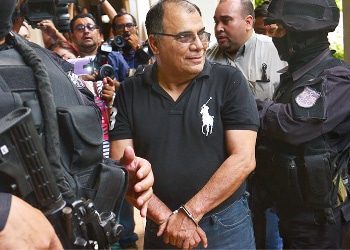A business magnate who was an alleged leader of El Salvador’s Texis Cartel has escaped justice once again after a court dropped money laundering charges against him.
An El Salvador appeals court on May 21 ruled in favor of José Adán Salazar Umaña, alias “Chepe Diablo,” concluding that he should not have been tried on charges of laundering some $100 million because he had already been judged, El Diario de Hoy reported. Salazar Umaña’s lawyers had previously argued that prosecution subjected him to double jeopardy, the legal principle that people cannot be tried twice for the same offense.
In April, Salazar Umaña’s lawyers told the court that he had already been prosecuted on the money laundering charges when he settled an earlier tax evasion case. Former Metapán mayor Juan Umaña Samayoa, an associate of Salazar Umaña’s, also had charges against him dropped in the same May 21 ruling by the appeals court.
The court had been set to rule on the case against Chepe Diablo and Umaña Samoya when their lawyers made the appeal to have the charges dropped. Both faced 15 to 20 years in prison if convicted.
Salazar Umaña and Umaña Samoya have both said they are innocent of all charges.
The trial against Chepe Diablo and Umaña Samoya began in October 2020. Prosecutors accused them and seven others of moving more than $500 million in unjustified income through an agro-industrial company and a hotel consortium between 2003 and 2015. By not declaring that income, prosecutors said, some $132 million in taxes was lost, forming the basis for the money laundering charges, Diario El Salvador reported.
At the trial’s conclusion in February, Prosecutor David Leiva highlighted the massive amount of evidence provided by the Attorney General’s Office in the case, including 2,600 exhibits, 100 witnesses and 3,000 pages of expert testimony.
InSight Crime Analysis
Salazar Umaña’s prosecution had been a landmark organized crime case in El Salvador, and its apparent dismissal is likely to make waves in US government circles, which increasingly see the country as hospitable to corrupt interests.
Because of his considerable business and political connections, Salazar Umaña long has had a reputation of being untouchable. He had managed to evade troublesome investigations for decades until his arrest four years ago and his recent trial.
Though never charged with drug trafficking, Salazar Umaña has long been accused of being a leader of the Texis Cartel, El Salvador’s most powerful mafia. The United States placed him on the drug “Kingpin List” in 2014. Three years later, he was removed from it when the US Treasury Department said there was insufficient evidence to support that he continued to play “a significant role in international narcotics trafficking.”
A 2011 report by El Faro first described the founding of the Texis Cartel by three men, including Salazar Umaña. According to the investigation, the US Drug Enforcement Administration (DEA) turned over a file in 2001 that alleged Salazar Umaña to be linked to drug trafficking and money laundering interests.
Salazar has always maintained that his enormous wealth has come from his legitimate businesses, which include grain production, trucking and hotels.
That same wealth, though, has gotten him in hot water. In April 2014, prosecutors accused Salazar Umaña of evading taxes in 2010 and 2011. The financial audit led to a money laundering investigation after it was determined that he could not justify more than $1.4 million in earnings in 2010 alone.
To settle the tax probe, Salazar Umaña paid more than $1 million in cash to El Salvador’s treasury department (Ministerio de Hacienda). The money laundering investigation was delayed and effectively iced by then-Attorney General Luis Martínez, who ordered his attorneys to destroy evidence and return incriminating documenting documents. Martínez now faces charges of corruption in a case unrelated to Salazar Umaña’s.
Attorney General Douglas Meléndez, Martínez’s successor, later revived the investigation. In April 2017, authorities arrested Salazar Umaña and raided more than two dozen businesses and properties connected to him.
Now, after four years in the courts and a four-month trial, the case against Salazar Umaña has been dropped on what appears to be a legal technicality.
The questionable ruling comes at a time when El Salvador and other countries, such as Guatemala, appear to be publicly defying US pressure to crack down on corruption.
Earlier this month, legislators aligned with El Salvador President Nayib Bukele ousted the country’s top prosecutor and five constitutional court justices. Legislators also passed a law granting immunity to officials accused of profiteering during the COVID-19 pandemic.
The dropping of the charges is likely to only increase tensions between El Salvador and the United States, particularly since a US Congressman James McGovern, Democrat of Massachusetts, had pushed for the investigation into the Texis Cartel just before Chepe Diablo was arrested.
The decision to “drop the charges and annul the results of the trial, despite massive evidence of multiple crimes, is a serious blow to El Salvador’s endangered justice system,” McGovern told InSight Crime in an emailed statement.
*This story has been updated to add comment from Congressman McGovern

